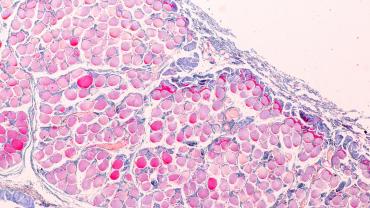
Cellular senescence is a potential driver of many biochemical changes leading to age-related diseases (ARD). It is a process in which certain cells, after becoming stressed or damaged, may become resistant to apoptosis, undergo irreversible replicative arrest, and have increased metabolic activity.
Studies suggest that even a relatively small quantity of senescent cells (SCs) may cause tissue dysfunction. Although rare in younger individuals, SCs increase in many tissues within the body during the aging process. Tissues containing SCs may be more vulnerable to disease onset and progression, increased inflammation, and decreased function over time. Recent research suggests that resveratrol may support immune function, a healthy inflammatory response, and the body’s response to certain SCs, including senescent macrophages.
Macrophages are important players in immune function. M1 macrophages are involved in the inflammatory response and secrete cytokines, such as interleukins (IL)-6, IL-1β, and tumor necrosis factor-alpha. M2 macrophages secrete cytokines related to osteogenesis and angiogenesis. Macrophages can switch from M1 to M2 phenotype under certain conditions. Delays in the macrophage phenotype switch can be caused by mitochondrial dysfunction and endoplasmic reticulum stress.
A recently published laboratory study by Hang and colleagues discussed the potential role of resveratrol supplementation during the osseointegration process. During osseointegration in middle-aged individuals and younger, the macrophage phenotype switch is timely. However, senescent macrophages may cause a delay in the switch, potentially resulting in prolonged inflammation.
Resveratrol is a polyphenolic compound found in grape skins, dark berries, and peanuts that have been shown to help support a normal inflammatory response. It supports antioxidative status by targeting the transcription factor nuclear factor erythroid 2-related factor (Nrf2). Resveratrol may also help modulate cyclooxygenase (COX)-1, COX-2, prostaglandins, leukotrienes, interleukin (IL)-1β, and nuclear factor-kappa B (NF-κB). It may also help to activate sirtuin 1 (Sirt1) and to modulate autophagy. The autophagy of SCs may help restore homeostatic conditions.
Hang and colleagues report that resveratrol may support normal activity of inducible nitric oxide synthase (iNOS), and healthy levels of IL-1β and NF-κB, biomarkers associated with M1 macrophages. Because of this, resveratrol may help support the M1 to M2 switch. Resveratrol may also help support conditions to support cellular health including the inhibition of reactive oxygen species (ROS) production.
The authors reported increased levels of autophagy of senescent macrophages in the presence of resveratrol. In addition, resveratrol was shown to modulate iNOS expression in a concentration-dependent manner.
More research is needed, particularly in the clinical setting, however, studies indicate that resveratrol may support cellular health. Resveratrol may also help support the inflammatory response and the body’s response to SCs.
By Colleen Ambrose, ND, MAT